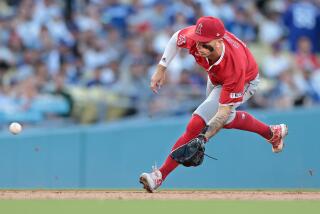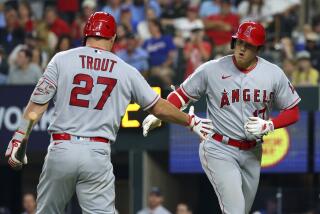Fast Learner
- Share via
Baughman the burner was in overdrive.
Justin Baughman (pronounced BOK-man) had just dropped a sacrifice bunt in front of the mound and was streaking toward first. Oakland Athletic pitcher Mike Oquist pounced on the ball, glanced at third and then realized he shouldn’t have peeked. Oquist threw his best fastball of the night to first, but the fastest man in the Angels’ organization got there first.
It was the second time in his four-game major league career that he had sacrificed and then burned opponents by advancing the runner without giving up the out. His first hit and run batted in came on a squeeze bunt against Detroit in his big league debut.
“This is going to be fun to watch,” Manager Terry Collins said. “You look somewhere else and you have no chance. That’s one of the reasons he’s here right now.”
Well, that and Randy Velarde’s surgically reconstructed right elbow. Velarde has played in two games this year and hit two home runs in five at-bats. If Velarde were sound, Baughman would have to settle for watching the Angels play on days off from his job as a shortstop in Lake Elsinore.
A couple of months ago, Baughman figured his only claim to fame in 1998 would be that he went to the same college (Lewis & Clark) at the same time as Monica Lewinsky. But in a twist of tendon and fate, Baughman is turning the double play from the other side these days and wowing big leaguers with his sprinting ability.
“It’s funny because you’d never think he was that fast by looking at him,” Gary DiSarcina said. “I came up after one of those bunts the other day and the catcher was shaking his head and he said, ‘That guy can really fly.’ ”
A year ago, Baughman, 23, was happy to be blazing around the basepaths at Class-A Lake Elsinore. The Angels--who evidently have learned to prepare for the worst--moved Baughman to second base in spring training while Velarde struggled with his aching elbow.
Then they popped him into the second-base slot at triple-A Vancouver, where he was 31 games into adjusting to a new position and a new level of pitching when he got the call.
“Everything happened so fast,” Baughman said. “There’s a big adjustment from single A to triple A, the pitchers have a lot more pitches and better control and you have to learn to be a lot more patient. Most of it is an adjustment in confidence, but I struggled at first.”
He quickly settled into a comfort zone, however, and hit .321 with the Canadians. So far, he has fared pretty well against major league pitchers too. He’s hitting .306 with 11 hits in 10 games.
He has been sometimes spectacular, usually steady on defense--he has made one error--but making the switch from shortstop to second is not the natural transition it might appear to be. For a guy who has played shortstop all his life, the move to second is sort of like playing the game while looking in a mirror.
“At the end of my career, I tried to make that change,” said Angel third base coach Larry Bowa, who holds the major league record for highest lifetime fielding percentage as a shortstop (.980). “I couldn’t do it. It was very difficult. Everything looks different. It’s all backward.
“At shortstop, the double play, everything is in front of you. Playing second, you get blindsided. It’s harder for a shortstop to move to second than the other way around. It’s much more of an adjustment. But he’s a young kid, he’s willing to work hard and he’s not too apprehensive about it.”
Well, two out of three, anyway. Baughman has had his doubts.
“The ball comes off the bat at this different angle,” he said. “It’s a whole new look and you start to wonder, ‘Geez, can I still field a ground ball?’ You start thinking things like that and you can really get into trouble.”
The Angels are confident Baughman will make the transition, giving them something they haven’t really had since Bobby Grich in the ‘80s . . . an everyday second baseman.
“I’ve worked with more than my share of second basemen, I can’t even begin to count how many, in my seven years here,” DiSarcina said. “My idea of a regular second baseman is someone who starts 155 games a season, not someone who starts four times a week. He’s got special abilities. He’s already given us a big lift with his speed. It’s a refreshing change for us.”
Collins was impressed with Baughman in spring training and often said so. When it became apparent that Velarde’s return would be short, Collins had no qualms about calling up Baughman.
“He’s a good-looking player, he’s got some moxie,” Collins said.
“We feel good about having him playing second base. He’s going to play hard, he’s got great instincts and he’s very intelligent. I put a squeeze on him in his first big league game and then I thought, ‘Gee, I hope he knows the signs.’ ”
He did, Jim Edmonds scored easily and Baughman, having outrun another baseball, ended up on first base.
“This is a guy who’s got a real high ceiling,” Collins said, “and we’re sticking with him unless he really starts to get buried.”
Baughman is pleased that everyone seemed so impressed with his cornering ability when he sprinted from first to home on a double. But he’s not taking anything for granted.
“I didn’t get this chance because they wanted me here, it’s because they had to do it,” he said. “I certainly don’t feel like I have the luxury of having time to sort of settle in.
“So I have to find ways to help us win right now.”
He already has on a couple of occasions.
Sometimes a 10-foot hit can be just as valuable as a 500-foot one.
More to Read
Go beyond the scoreboard
Get the latest on L.A.'s teams in the daily Sports Report newsletter.
You may occasionally receive promotional content from the Los Angeles Times.






